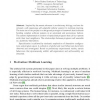106 search results - page 14 / 22 » Rapid prototyping using evolutionary approaches: part 2 |
CORR
2008
Springer
13 years 7 months ago
2008
Springer
Scheduling problems are generally NP-hard combinatorial problems, and a lot of research has been done to solve these problems heuristically. However, most of the previous approach...
FCCM
2007
IEEE
13 years 11 months ago
2007
IEEE
While medium- and large-sized computing centers have increasingly relied on clusters of commodity PC hardware to provide cost-effective capacity and capability, it is not clear th...
ECAL
2005
Springer
14 years 1 months ago
2005
Springer
Abstract. Inspired by the recent advances in evolutionary biology, we have developed a self-organising, self-adaptable cellular system for multitask learning. The main aim of our p...
SIGSOFT
2003
ACM
14 years 8 months ago
2003
ACM
Although graphical user interfaces (GUIs) constitute a large part of the software being developed today and are typically created using rapid prototyping, there are no effective r...
BMCBI
2011
12 years 11 months ago
2011
Background: Orthology analysis is an important part of data analysis in many areas of bioinformatics such as comparative genomics and molecular phylogenetics. The ever-increasing ...



